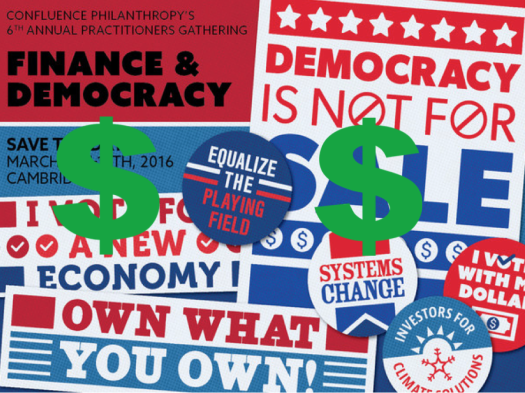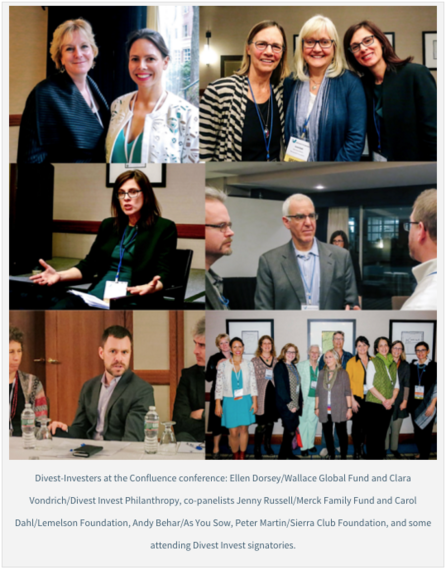It's been said - if you own fossil fuels, you own climate change. Both as individuals and as directors of the Hanley Foundation, we have been Divest Invest signatories since 2014. Here's our story that will hopefully inspire you to join the movement as well.
For the past 10 years, I've been an impatient climate activist. To keep the ball rolling, I've protested, marched, blogged, testified, lobbied and donated to countless projects and politicians. Through the foundation my husband and I created (focused on advancing environmental, educational and empowerment solutions), we've supported climate policy and advocacy campaigns, Beyond Coal, clean energy innovation prizes, environmental education, art exhibits and so on. But it's been really frustrating at times. For years climate policy was a no-go.
Let me take you back to November 2012. This was before Pres. Obama had a climate agenda and Pope Francis was even the pope. I went with a group of activists to the Do the Math tour stop in Chicago. There, Bill McKibben explained that physics demands we keep 80% of fossil fuels in the ground to avert planetary catastrophe. He fired up college students to begin apartheid-style divestment campaigns at their universities to fight back against the reckless fossil fuel industry. Suddenly, the clouds started to part. I began to see that divestment might just be the ultimate disrupter. I was so excited! I went straight home to my husband and told him all about it. This time, I said, we might actually be able to influence real change. We're donors at the University of Dayton (UD), you're an alum, on the board and on the investment committee. You've got to do this. He nodded along and then said, Amanda, I will get laughed out of the room if I bring this up. I was crushed. That sleepness night I kept rehashing all the reasons why this made absolute sense. Universities get climate science. The Catholic church does too and is active on moral grounds. UD has made climate commitments and major sustainability initiatives.They comply with other mission aligned investment screens. And aren't universities supposed to be investing in their students' future? I would not let up. To make a long story short, after a year of due diligence and steps forward and back, George and visionary university leaders gratefully came through. In July 2014, the board unanimously voted to divest from Carbon Underground 200 and Filthy 15 companies from their $670 million endowment. This is the first and only Catholic university to do this. They did so because of their commitment to environmental sustainability, human rights and their religious mission.
After the divestment announcement buzz, we often don't hear what happens next. First of all, the endowment is fine. If anything the returns have been positively impacted by divesting. But more importantly, there have been SO many other fringe benefits. First students and faculty were thrilled with the decision, seeing their university doesn't just talk the talk, but walks the walk. There has been record enrollment and record donations. The decision has attracted top talent in recruiting. For example, after a national search to replace the retiring president Dan Curran, who championed divestment, we are excited about the fabulous incoming president Eric Spina. He's coming from Syracuse where they coincidentally divested fossil fuels from their $1.18 billion endowment last year. Meanwhile, the university has ramped up investing in renewable energy funds and green bonds. Since they were rethinking the endowment, they also created a green revolving fund for energy efficiency retrofits on campus. Divestment has also given students hands on experience. Business students manage $25M of university's endowment and now have familiarity investing outside of coal, oil and gas. A new student managed impact investment fund is about to launched any day. Several new research partnerships relating to sustainability have also emerged. For example, business students are helping As You Sow analyze cleantech companies to build an interactive web tool. This partnership didn't happen with Harvard or Boston College because they are still clinging to fossil fuel investment despite student outcry. UD students now have cutting edge clean job skills. Overall, student engagement is at an all time high - sustainability is the most popular minor, learning living community and event focus.
Beyond Dayton, I have a much bigger dream to spark a larger Divest Invest wave across the entire Catholic community all the way to the Vatican. Through the Hanley Sustainability Institute, last fall we sponsored the first Catholic divest invest conference for universities, health care institutes and religious orders. It was an incredible conference that started a critical dialogue on how to invest in line with Pope Francis' encyclical.
I started with this UD example because divesting from our individual and foundation portfolios was pretty simple. It doesn't make sense for us to support climate protections on one hand and fund opposition with the other. We have a smart, responsive money manager at HighTower that has been helping us invest consistently with our values and mission for years. Our portfolios are fossil free - meaning there are no companies that extract, process, refine or distribute fossil fuels. When it comes to the investing side, it helps that my husband has a markets background and has been taking an an active role with impact investing. We have a range of clean energy and sustainable investments, including funds with Generation (through RBC), DBL Partners and Great Point Ventures. Our financial strategy is evolving. For example, on the grantmaking side, we've partnered with the Acumen Fund's Energy Portfolio for several years. It's tackling poverty through supporting clean energy start-ups such as dLight, M-Kopa Solar, Orb Energy, Husk Power and others that have improved more than 20 million lives. On the MRI side, we are now looking to invest in a fund scaling up off grid solar in E. Africa. Merging both sides, I'm part of a team developing a campaign (launching next year) that will call on philanthropy and faith groups to commit 1% of their investments toward clean energy access.
When it comes down to it, we want to make sure that across the board ALL of our philanthropy dollars - grants and investments - are being used to advance our mission, not undermine it.
Every argument against divestment is weak. There's no better time than now to join this important movement that includes individuals, foundations, universities, faith groups, non-profits, pensions, cities and others that represent more than $3.4 TRILLION in assets.
. . .
I shared our story at the Confluence Philanthropy Conference in Cambridge, MA in March, 2016.


